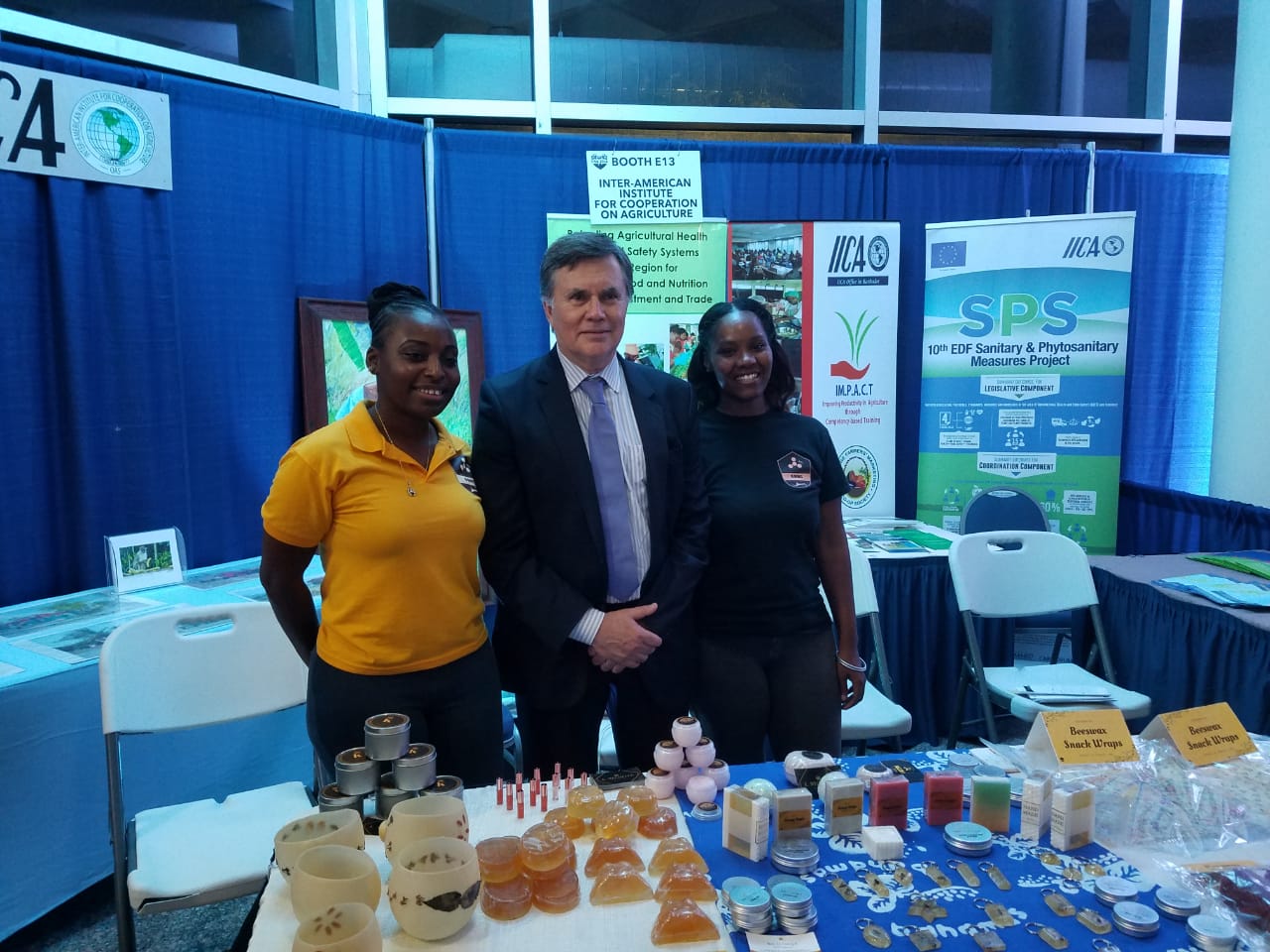While attending Caribbean Week of Agriculture, the region’s premier event for this sector, IICA’s Director General, Manuel Otero, remarked that the new challenges facing agriculture include the extensive interconnection between the issues specific to the sector and health and nutritional concerns. This is a dimension that IICA will incorporate into its portfolio of projects. Bioeconomy and food safety and health, core issues of IICA’s work, are fundamental to achieving this objective.

agri-business sector.
Bridgetown, Barbados, 11 October 2018 (IICA). Manuel Otero, Director General of the Inter-American Institute for Cooperation on Agriculture (IICA), attended the opening ceremony in Bridgetown of the Caribbean Week of Agriculture, the region’s premier event for the sector, where he held working meetings with the Ministers of Barbados and Guyana to move forward in implementing agricultural development plans in these two countries.
The opening of the event, which was attended by the Prime Minister of Barbados, the Honourable Mia Amor Mottley, and authorities from national, international, and research organizations, was preceded by a Ministerial meeting in which participants examined the food trade within the Caribbean Community (CARICOM) and its prospects. They also examined obstacles that currently inhibit any significant increase in this trade, including non-tariff barriers and logistics costs, particularly high prices to transport goods within the region.
This year’s theme for Caribbean Week of Agriculture is “Strengthening Agriculture for a Healthier Future in the Region”, and the event is being convened under the aegis of the Alliance for Sustainable Development of Agriculture and the Rural Milieu, presided over by the Minister of Agriculture, Rural Transformation, Forestry and Fisheries of St. Vincent and the Grenadines, the Hon. Saboto Caesar. The Minister also chaired an extensive debate on the removal of barriers to intraregional trade of agricultural products and its impact.
Otero remarked that, “We have one objective, which is to contribute to increasing production and improving quality, since quality is an imperative. Let me emphasize that agriculture’s new challenges include the importance of interaction between the areas specific to this sector and health and nutritional concerns. IICA must integrate the dimension of nutrition and incorporate it into its portfolio of projects. In this regard, IICA’s key areas of focus, specifically the bioeconomy and food health and safety, are critical to this new thrust”.
IICA’s Director General went on to argue that, “We must create a positive cycle by eliminating poverty through the production of high-quality food. This is the first step towards sustainability”. His remarks echoed the sentiments of Prime Minister Mottley, who in declaring Caribbean Week of Agriculture open, stressed the need to “deliver results” quickly.
The head of the Inter-American organization for rural and agricultural development went on to state that, “Success requires joint efforts and the creation of synergies to face the increasing challenges. We are in the process of implementing our 2018 – 2022 Medium Term Plan, IICA’s institutional roadmap, and we are going to honour our commitment to build a closer relationship between IICA and the Caribbean, guaranteeing that the region’s priorities are reflected in the Institute’s areas of focus.
Otero held discussions with Barbados’ Minister of Agriculture and Food Security, the Hon. Indar Weir, on the development of joint actions for the expansion of herds of Blackbelly sheep – Barbados’ most iconic breed -, the creation of linkages between agricultural production and the tourism industry, the bolstering of the beekeeping industry through South-South cooperation and possibilities for increasing the country’s access to financing and technology.
Barbados is aiming to multiply and improve herds of Blackbelly sheep – the breed that has best adapted to tropical agriculture – from the current total of 15,000 to 600,000 sheep over the next ten years, in order to increase productivity, guarantee the provision of meat to the local market, develop a goat leather industry, and produce an exportable amount of goods.
Another goal of the country is to develop rabbit meat production, as an alternative source of protein, and also small ruminant dairy production, particularly with the aim of supplying the tourism sector and promoting linkages between the food industry and this service sector that caters to the thousands of tourists that the country welcomes annually.
The meeting with Minister Weir followed a meeting between Otero and Primer Minister Mottley at Barbados’ Parliament building. The Head of State asked IICA to work alongside the Ministry of Agriculture and Food Security to increase the capacity of rural producers in Barbados and to improve their access to new technologies and financing.
The development of agriculture and increased food production on the island to guarantee the food supply and reduce imports are two clearly stated priorities of Prime Minister Mottley’s administration.
Otero pledged that, “We are going to support Barbados in its efforts to institute plans to increase Blackbelly sheep herds, to develop the greenhouse and beekeeping sectors, and also to increase the presence and involvement of young people in building a modern agriculture sector”.
IICA’s Director General also attended a working meeting with the Hon. Noel Holder, the Minister of Agriculture of Guyana – a country that is undergoing tremendous expansion of its agriculture sector – to discuss collaboration on instituting a comprehensive development plan for the sector, which includes specific strategies focusing on the needs of various communities in the country.
More information:
Ena Harvey, IICA Representative in Barbados











